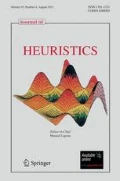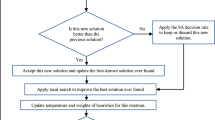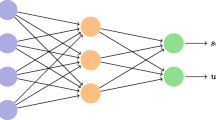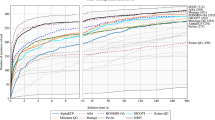Abstract
Weighted constraint satisfaction problems (WCSPs) is a well-known framework for combinatorial optimization problems with several domains of application. In the last few years, several local consistencies for WCSPs have been proposed. Their main use is to embed them into a systematic search, in order to detect and prune unfeasible values as well as to anticipate the detection of deadends. Some of these consistencies rely on an order among variables but nothing is known about which orders are best. Therefore, current implementations use the lexicographic order by default. In this paper we analyze the effect of heuristic orders at three levels of increasing overhead: i) compute the order prior to search and keep it fixed during the whole solving process (we call this a static order), ii) compute the order at every search node using current subproblem information (we call this a dynamic order) and iii) compute a sequence of different orders at every search node and sequentially enforce the local consistency for each one (we call this dynamic re-ordering). We performed experiments in three different problems: Max-SAT, Max-CSP and warehouse location problems. We did not find an alternative better than the rest for all the instances. However, we found that inverse degree (static order), sum of unary weights (dynamic order) and re-ordering with the sum of unary weights are good heuristics which are always better than a random order.
Similar content being viewed by others
References
C. and J.-C. Regin. (1996). “MAC and Combined Heuristics: Two Reasons to Forsake FC (and CBJ?) on Hard Problems.” Lecture Notes in Computer Science 1118, 61–75.
Bistarelli, S., U. Montanari, and F. Rossi. (1997). “Semiring-Based Constraint Satisfaction andOptimization.” Journal of the ACM 44(2), 201–236, March.
Cabon, B., S. de Givry, L. Lobjois, T. Schiex, and J.P. Warners. (1999).“Radio Link Frequency Assignment.” Constraints 4, 79–89.
Cooper, M. (2003). “Reductions Operations in Fuzzy or Valued Constraint Satisfaction.” Fuzzy Sets and Systems 134(3), 311–342.
de Givry, S., F. Heras, J. Larrosa, and M. Zytnicki. (2005). “Existentialarc Consistency: Getting Closer to Full arc Consistency in Weighted Csps.” In Proc. of the 19th IJCAI, Edinburgh, U.K., August.
de Givry, S., J. Larrosa, P. Meseguer, and T. Schiex. (2003). “SolvingMax-Sat as Weighted Csp.” InProc. of the 9th CP, Kinsale, Ireland, LNCS 2833. Springer Verlag, pp. 363–376.
Dechter, R. (2003). Constraint Processing. Morgan Kaufmann, SanFrancisco.
Larrosa, J., P. Meseguer, and T. Schiex. (1999). “Maintaining Reversible DACfor Max-CSP.” Artificial Intelligence 107(1), 149–163.
Larrosa, J., and T. Schiex. (2003). “In the Quest of the Best form of Local Consistency for Weighted csp.” InProc. of the 18th IJCAI Acapulco, Mexico, August.
Larrosa, J. (2002). “Node and arc Consistency in Weighted csp.” In Proceedings of the 18thAAAI, pp. 48–53.
Pearl, J. (1988). Probabilistic Inference in Intelligent Systems. Networks of PlausibleInference. Morgan Kaufmann, San Mateo, CA.
Sandholm, T. (1999). “An Algorithm for Optimal Winner Determination in Combinatorial Auctions.” InIJCAI-99, pp. 542–547.
Schiex, T., H. Fargier, and G. Verfaillie. (1995). “Valued Constraint Satisfaction Problems: Hard andEasy Problems.” In IJCAI-95, Montréal, Canada, August, pp. 631–637.
Author information
Authors and Affiliations
Corresponding author
Additional information
This research is supported by the MEC through project TIC-2002-04470-C03.
Rights and permissions
About this article
Cite this article
Heras, F., Larrosa, J. Intelligent variable orderings and re-orderings in DAC-based solvers for WCSP. J Heuristics 12, 287–306 (2006). https://doi.org/10.1007/s10732-006-8248-z
Issue Date:
DOI: https://doi.org/10.1007/s10732-006-8248-z




